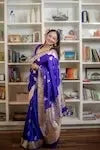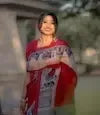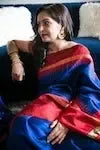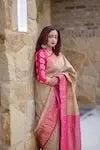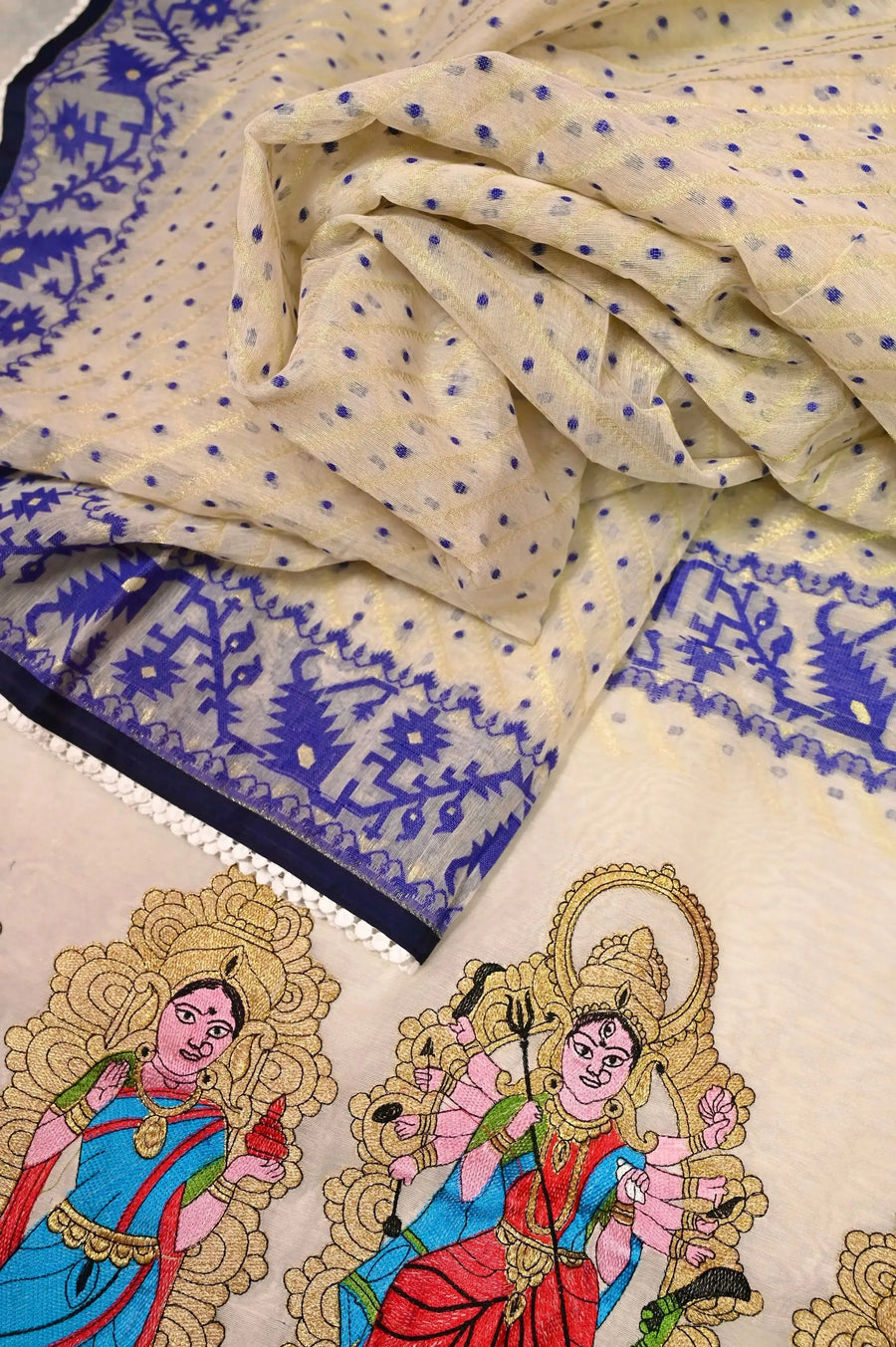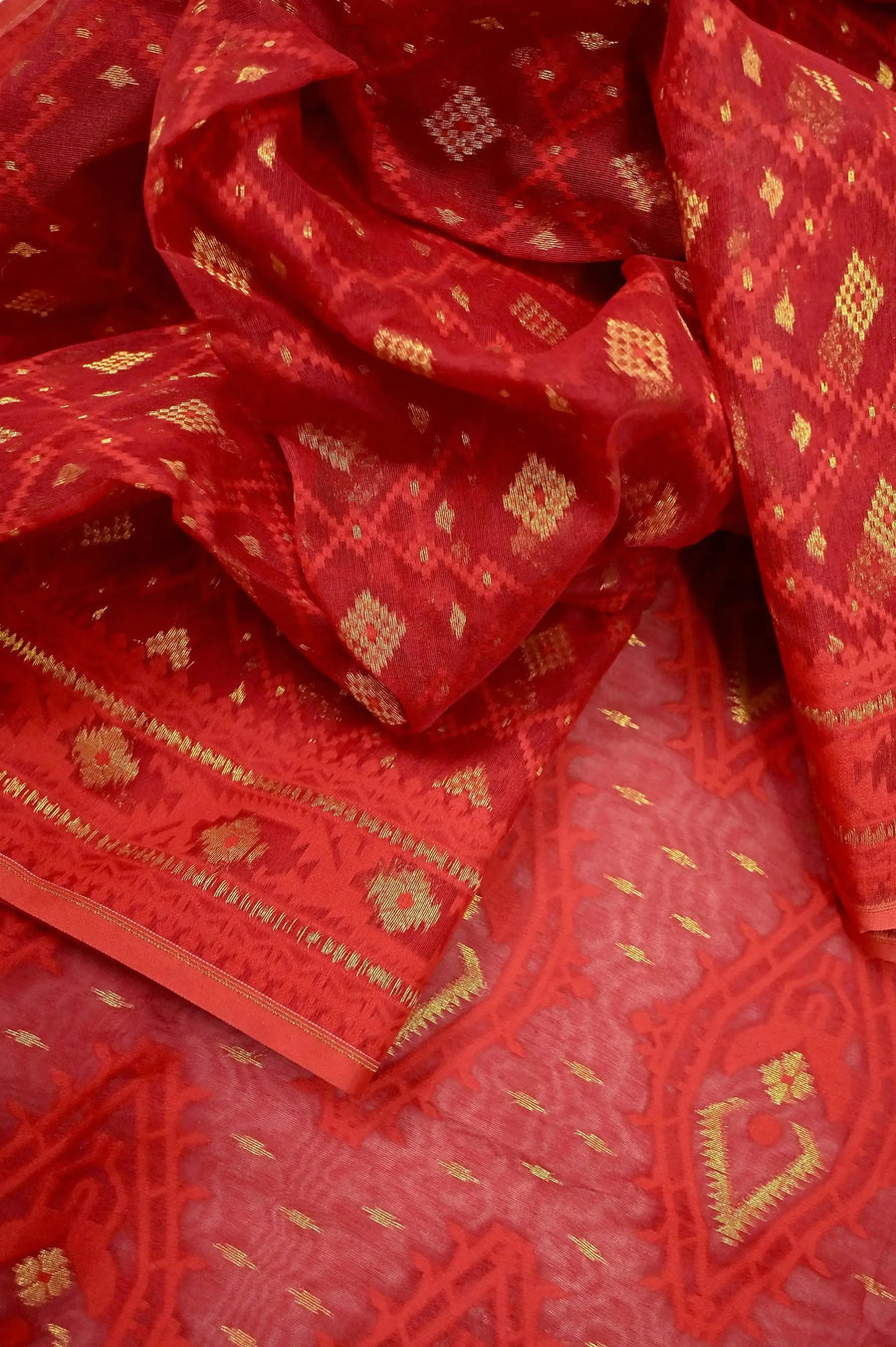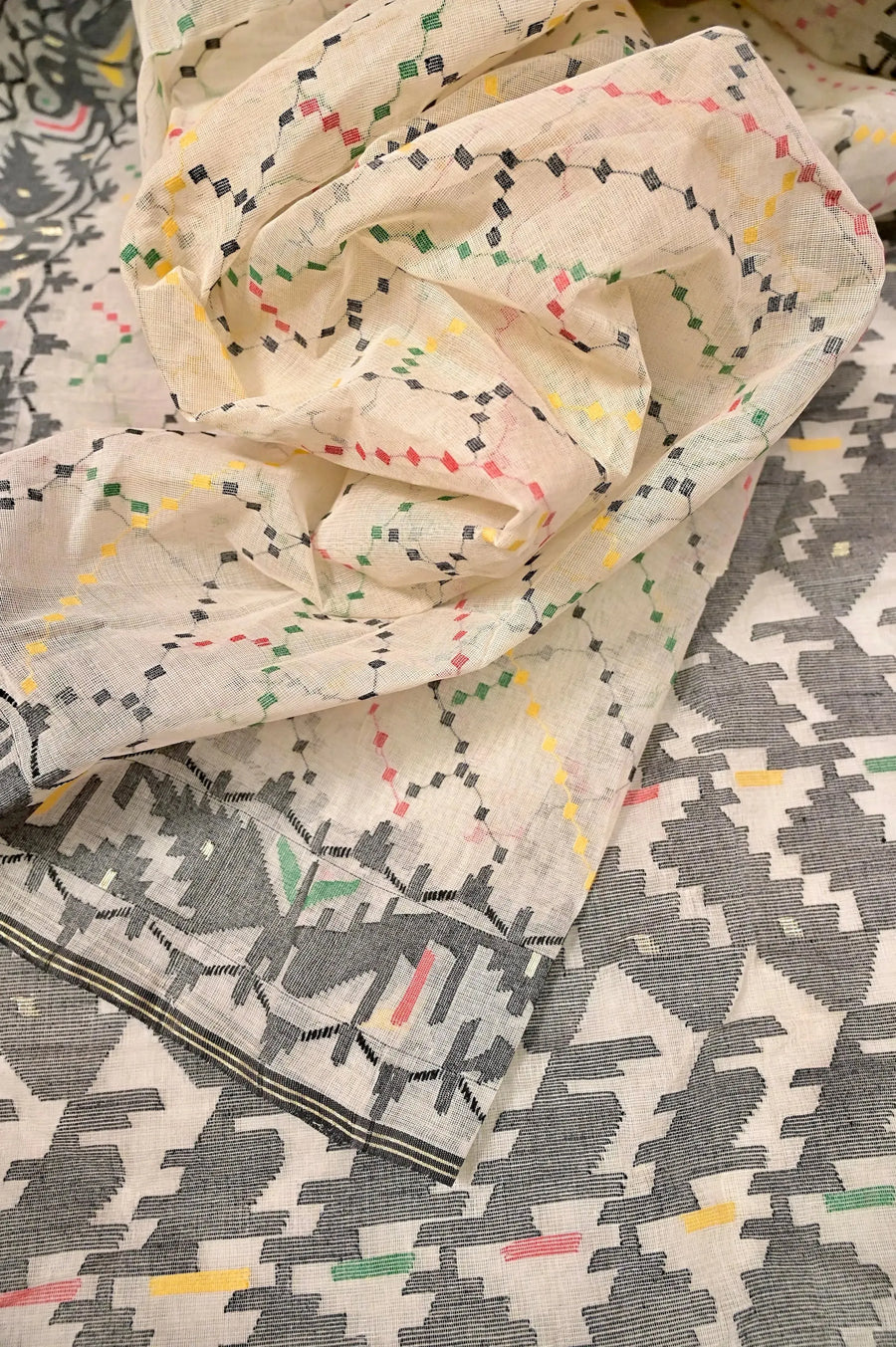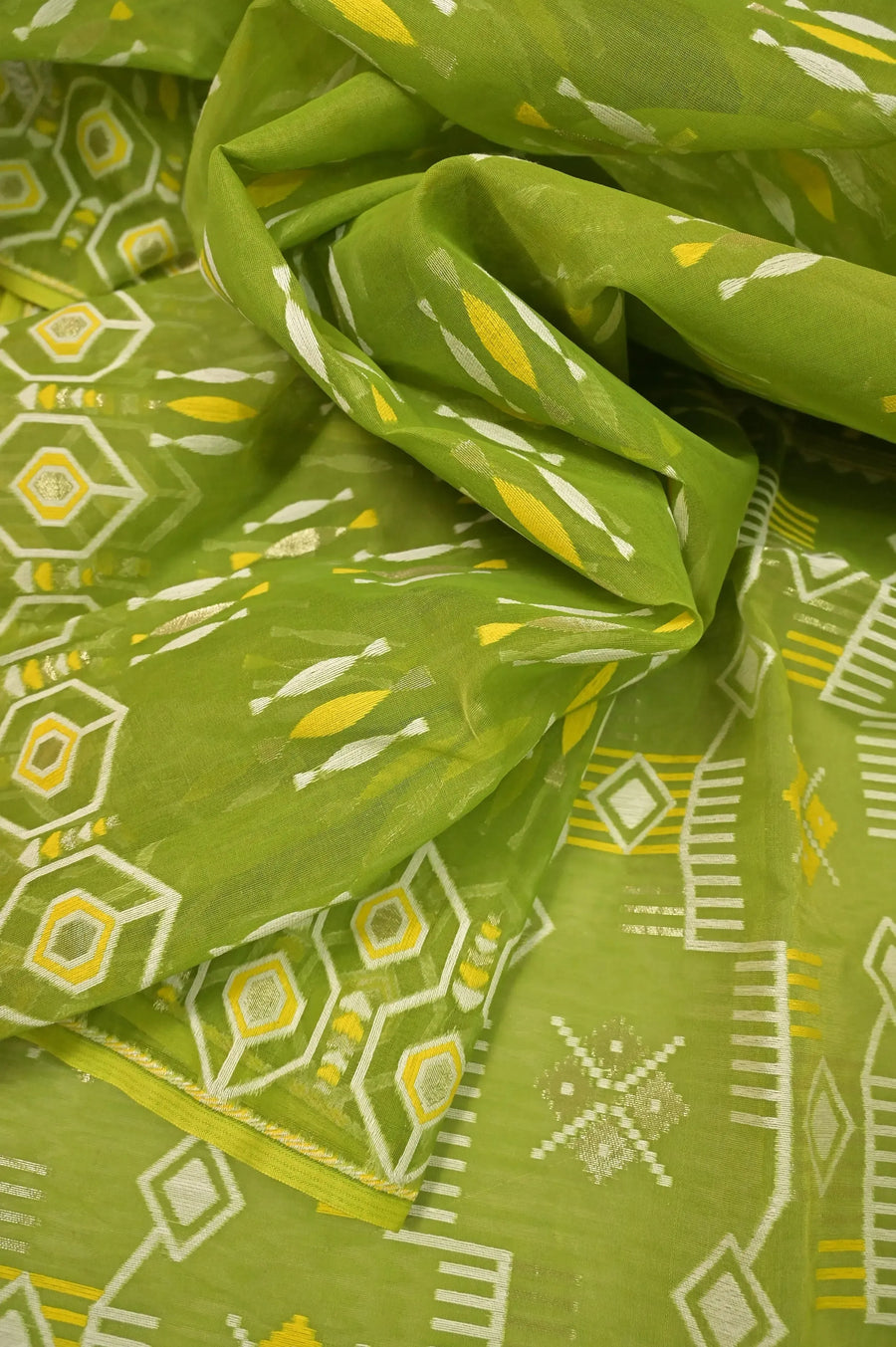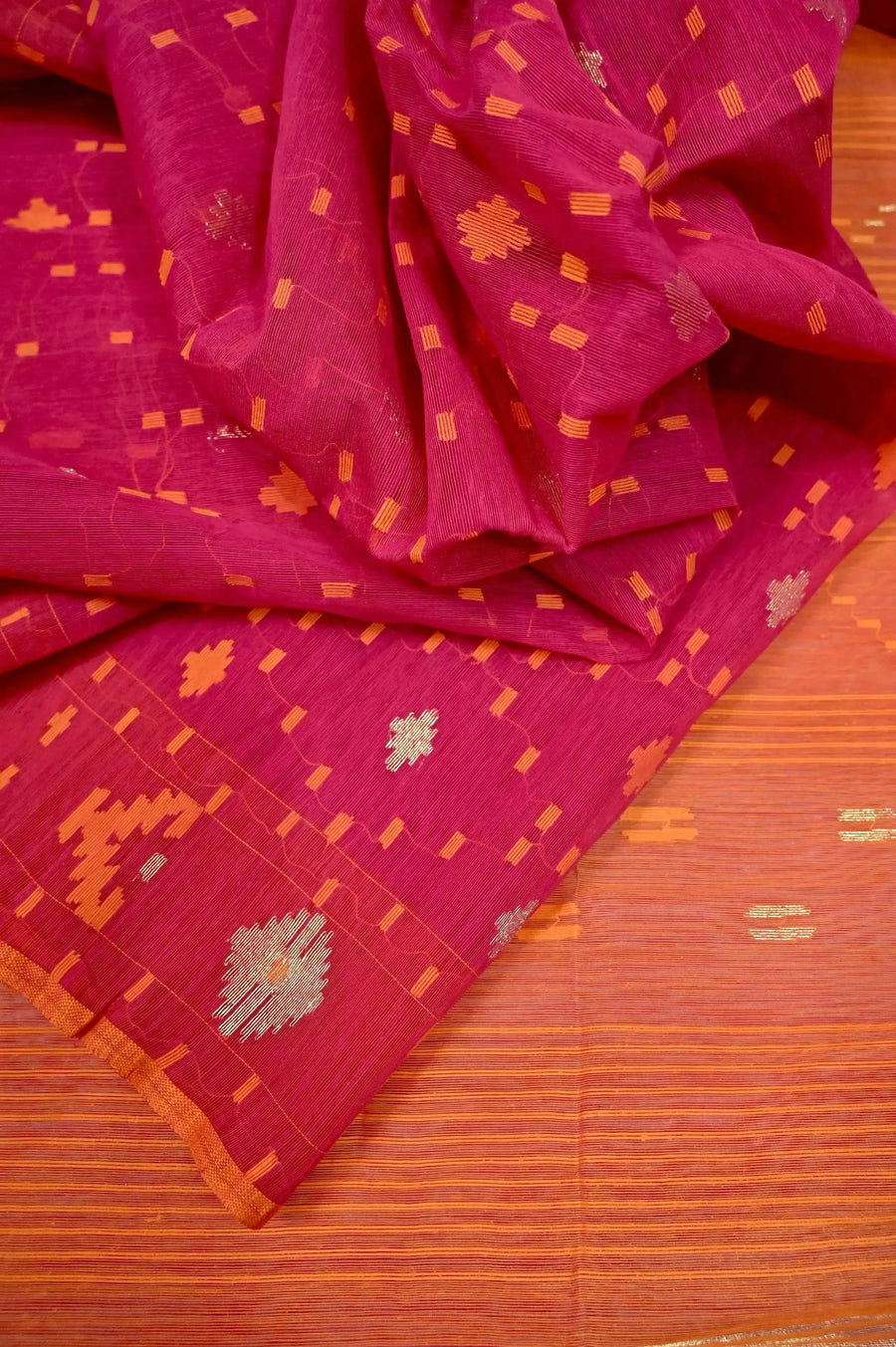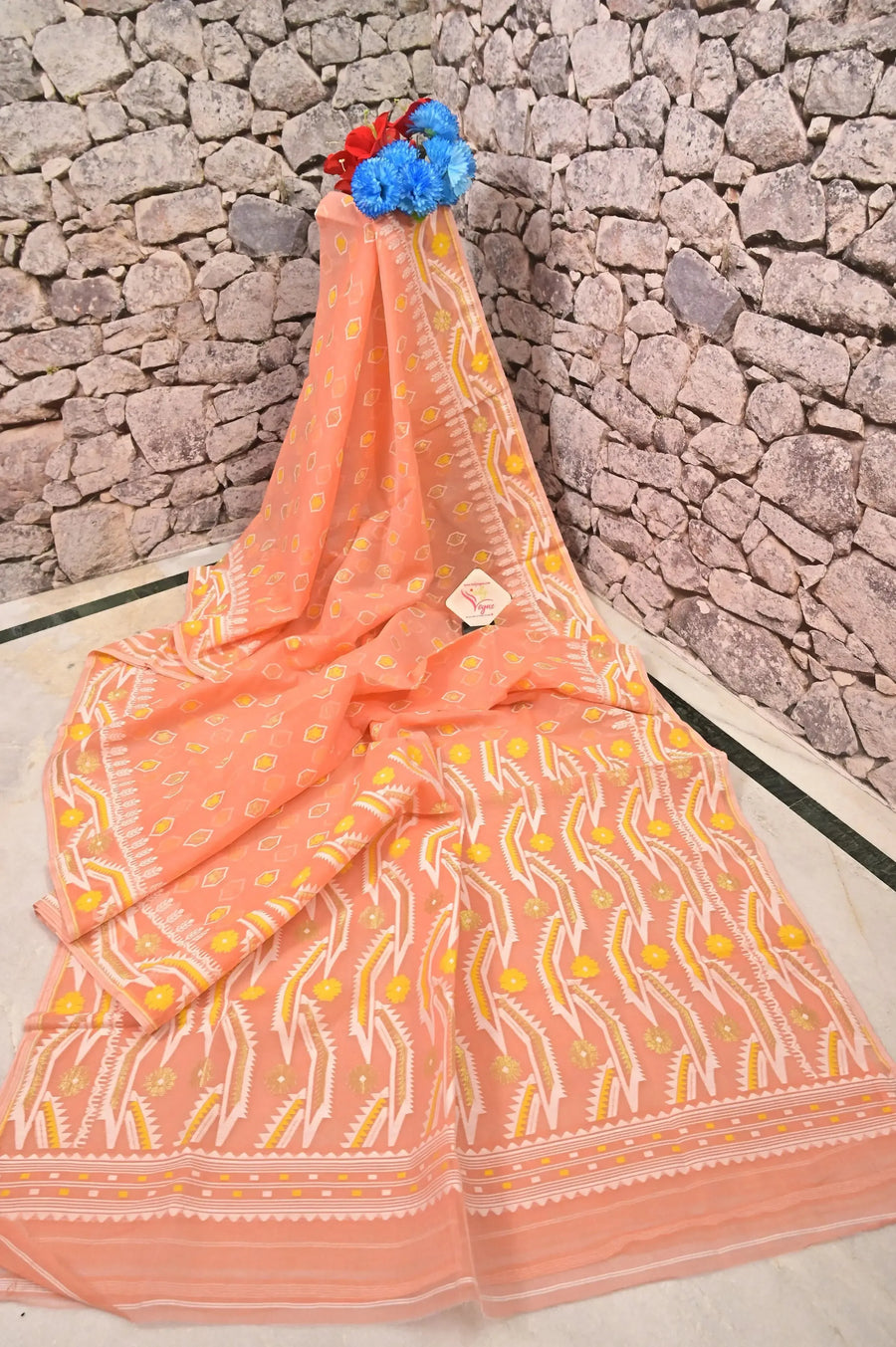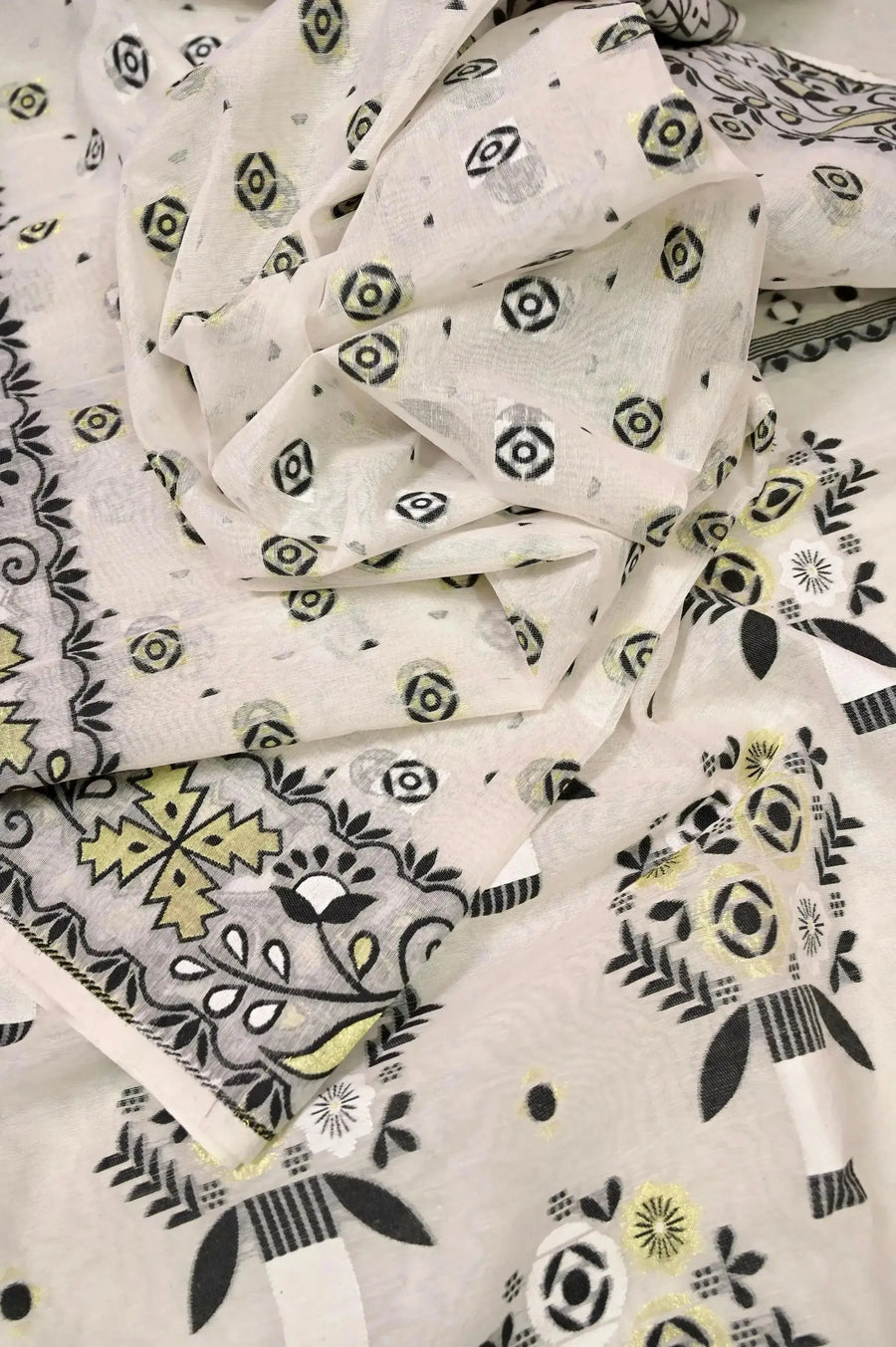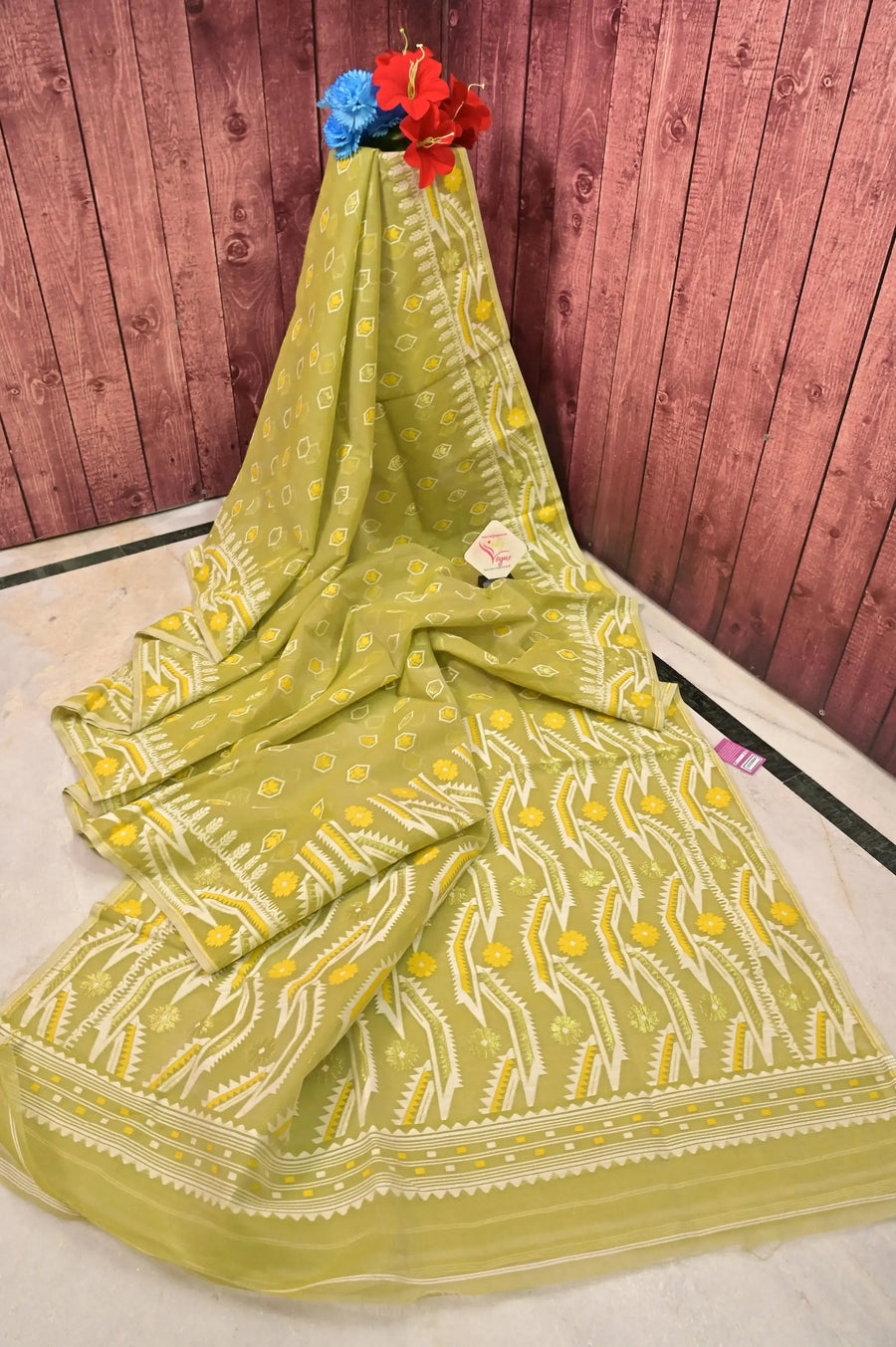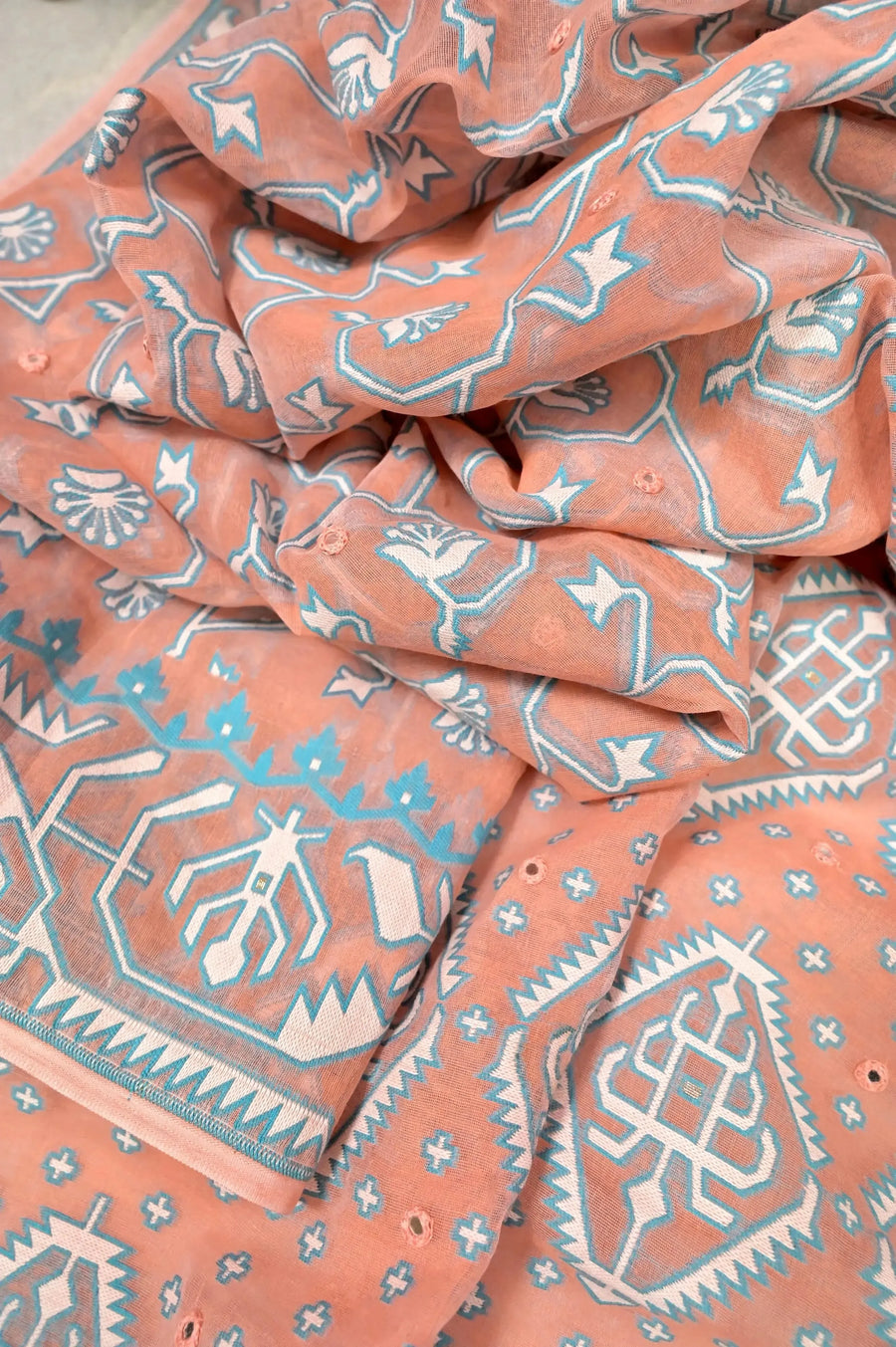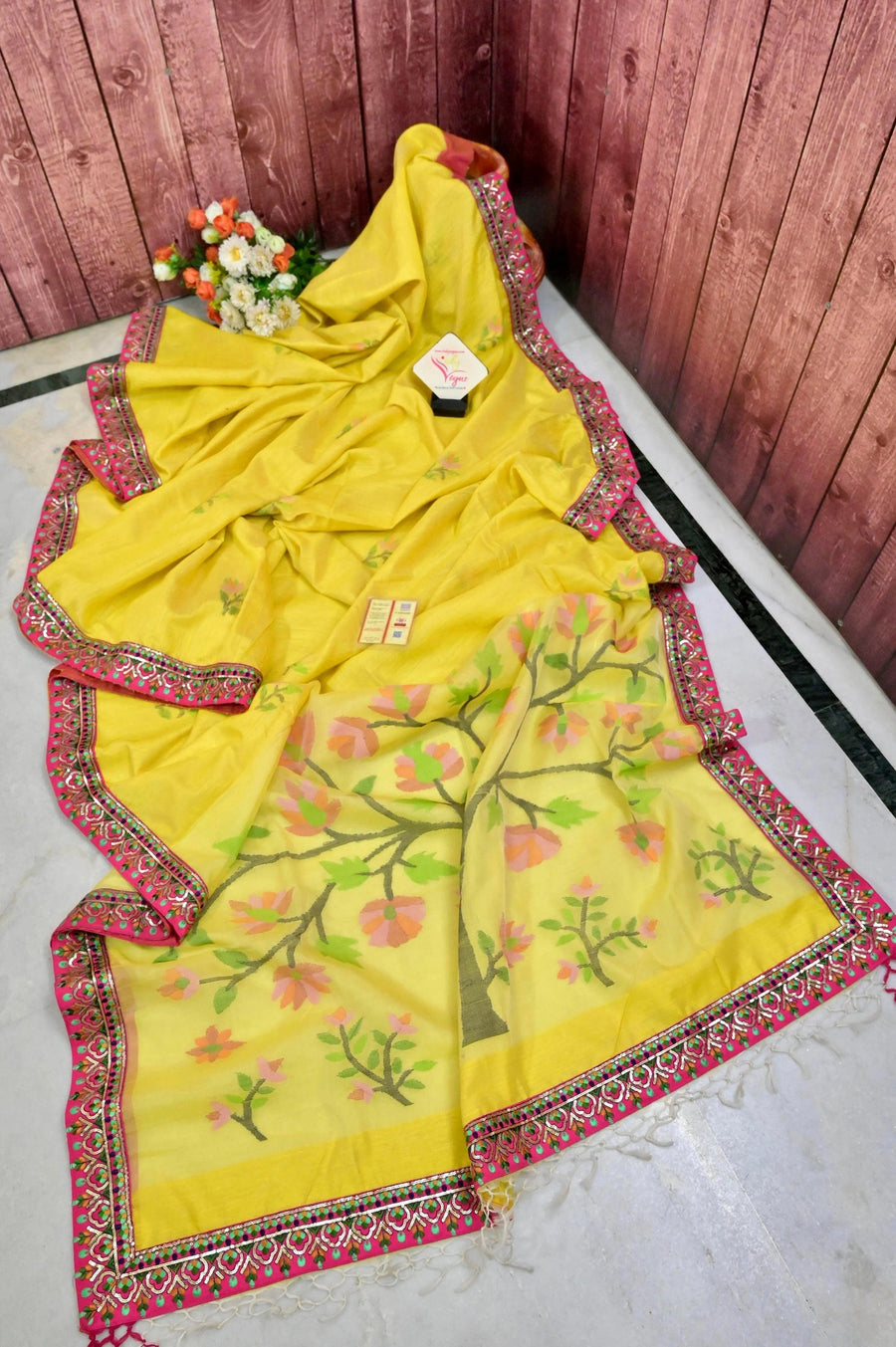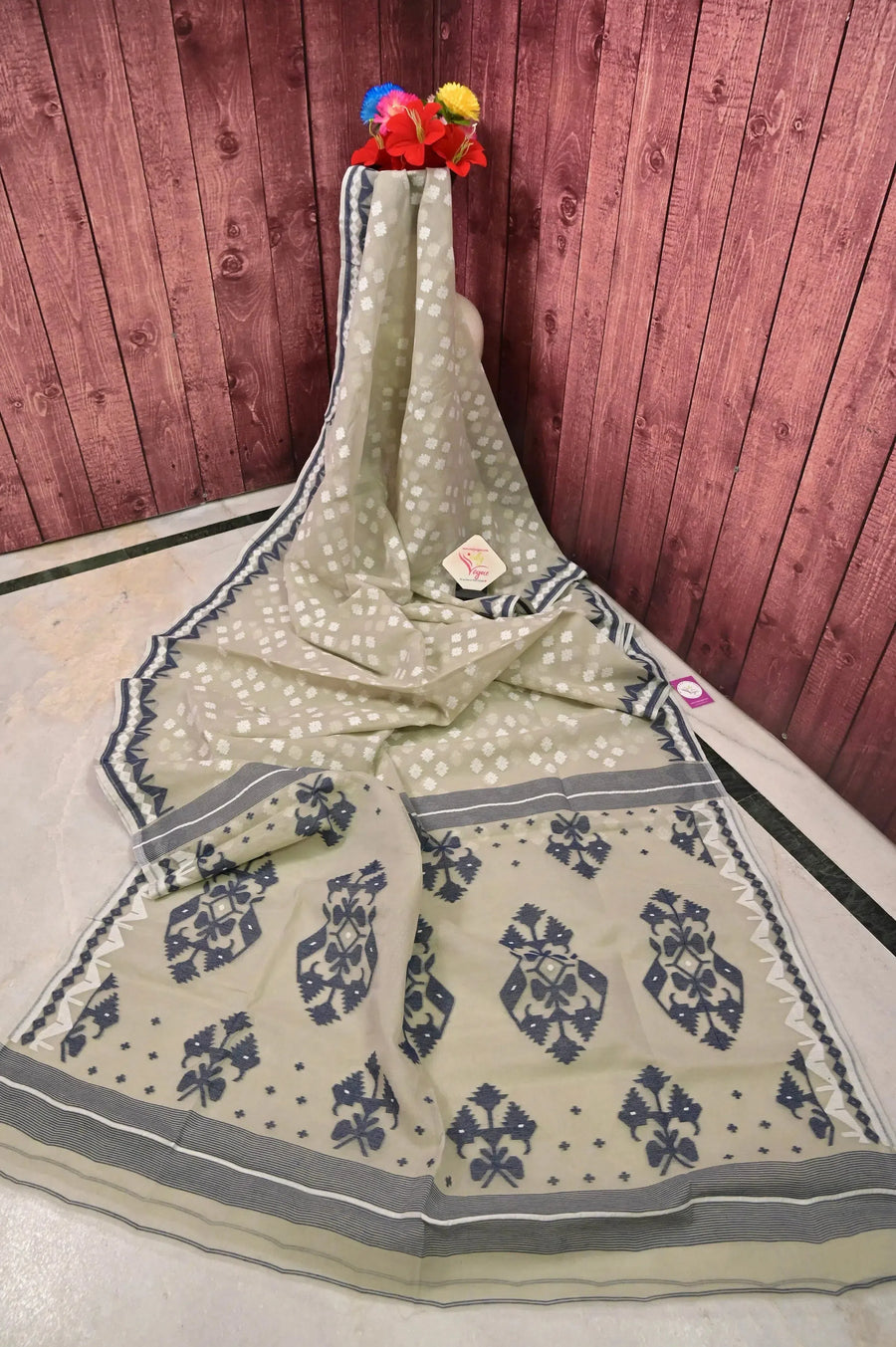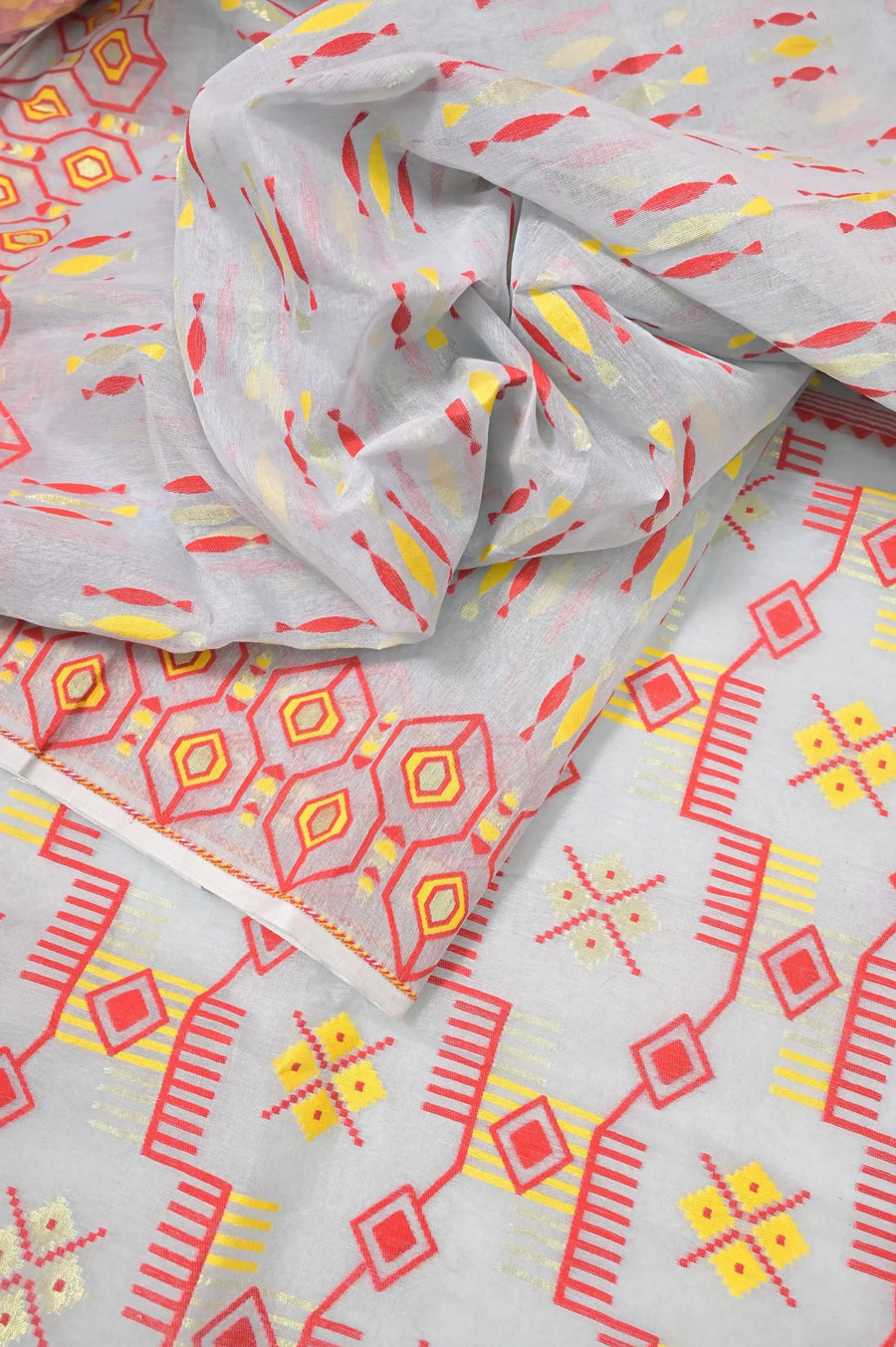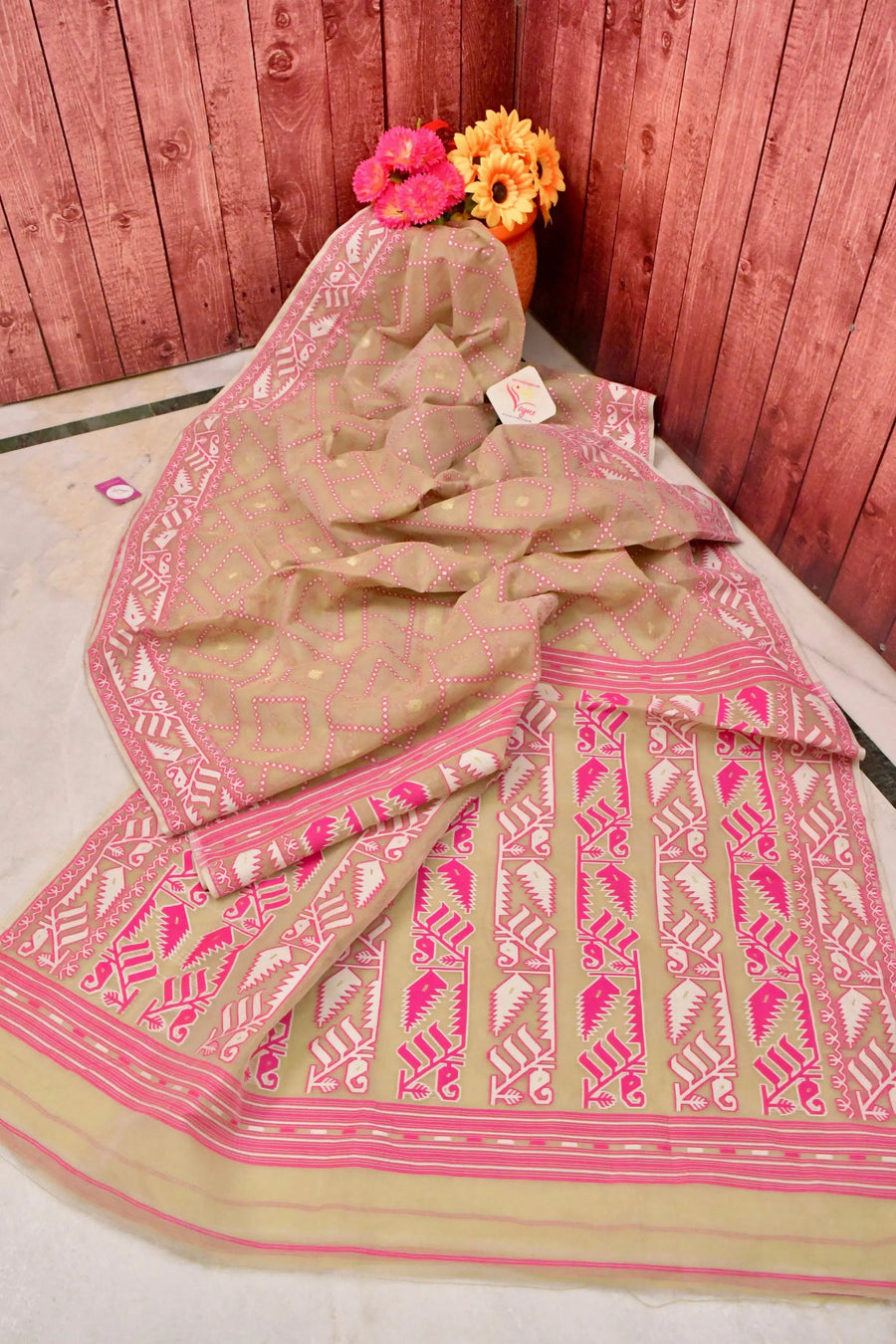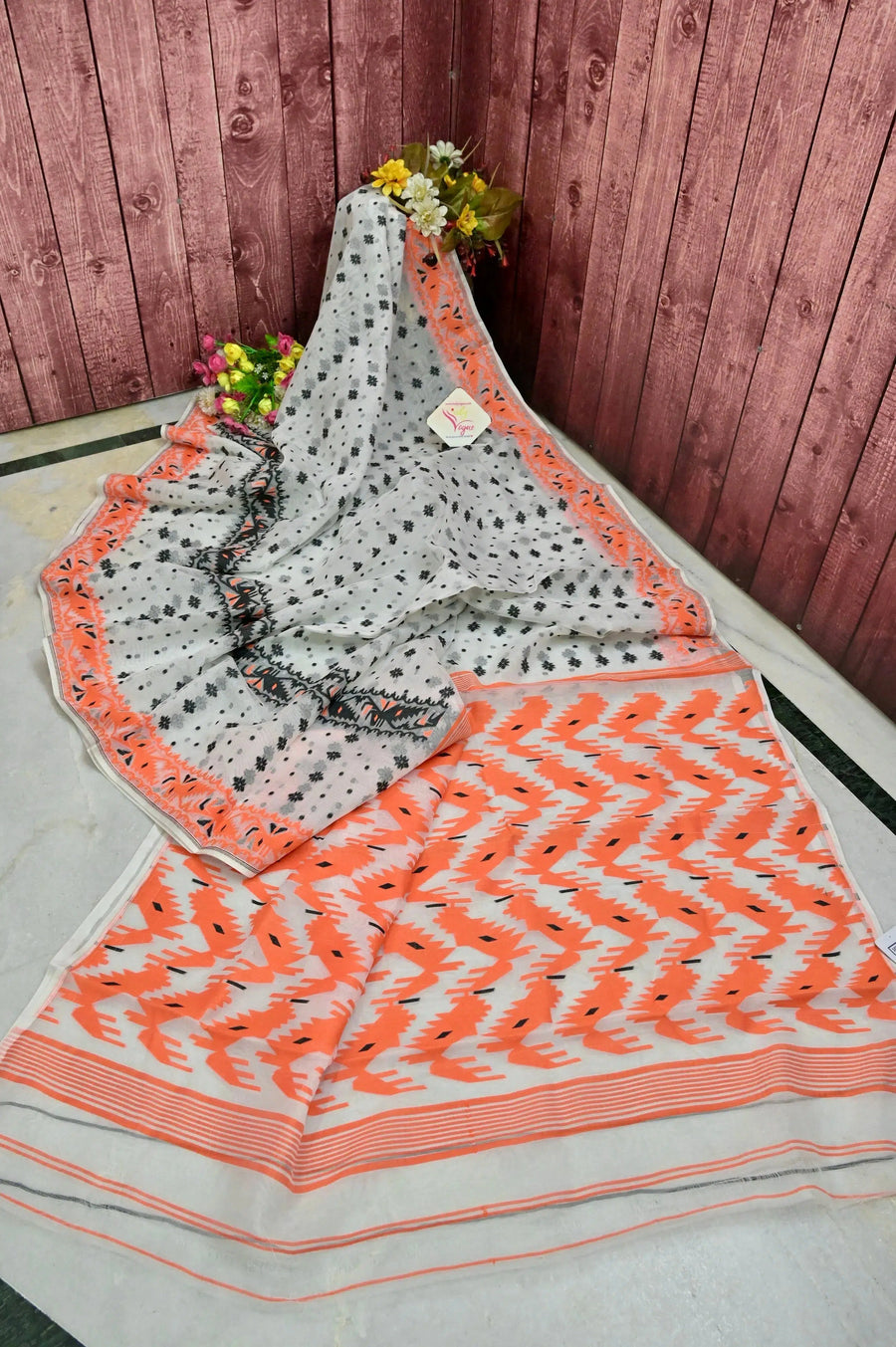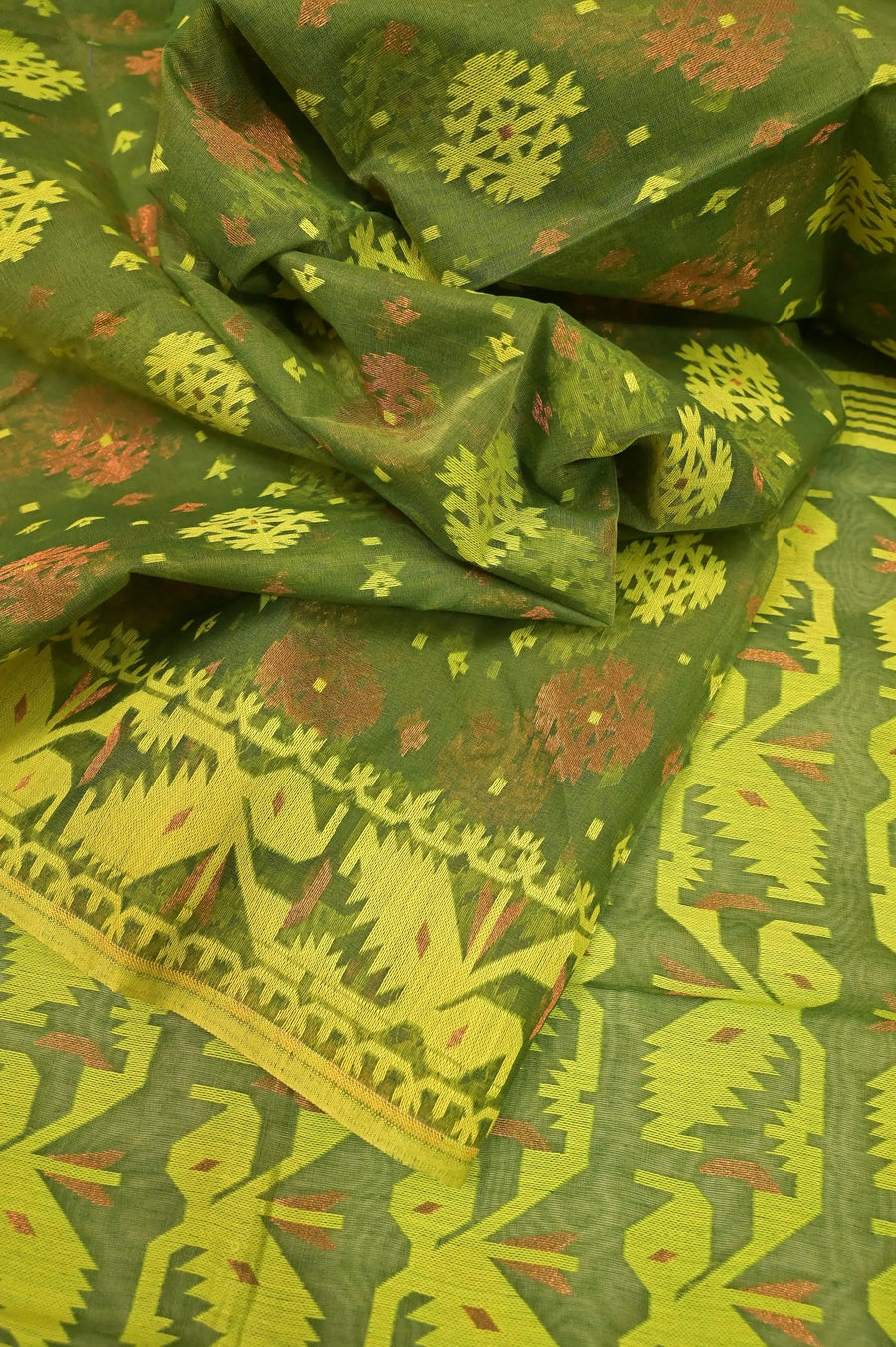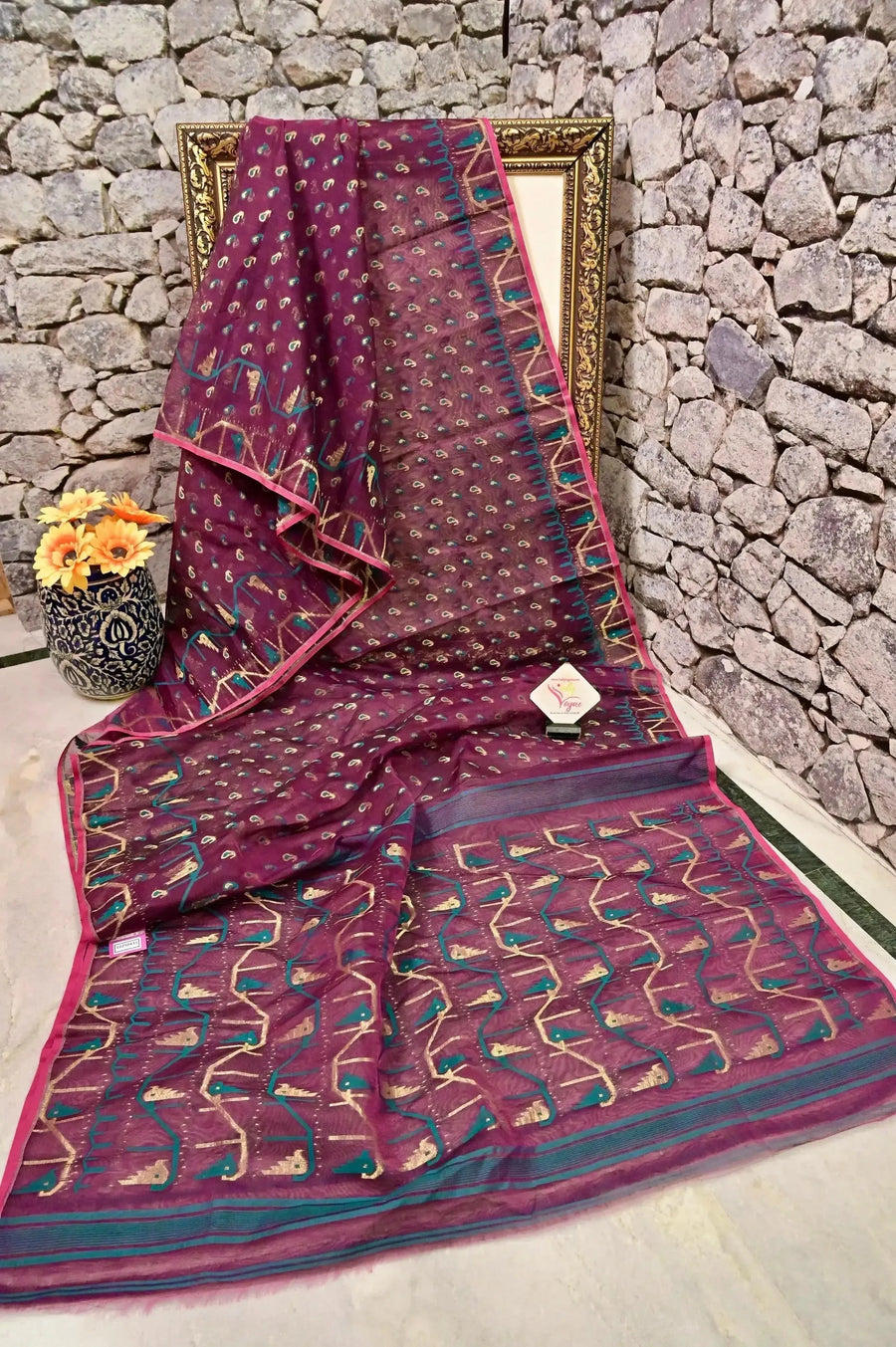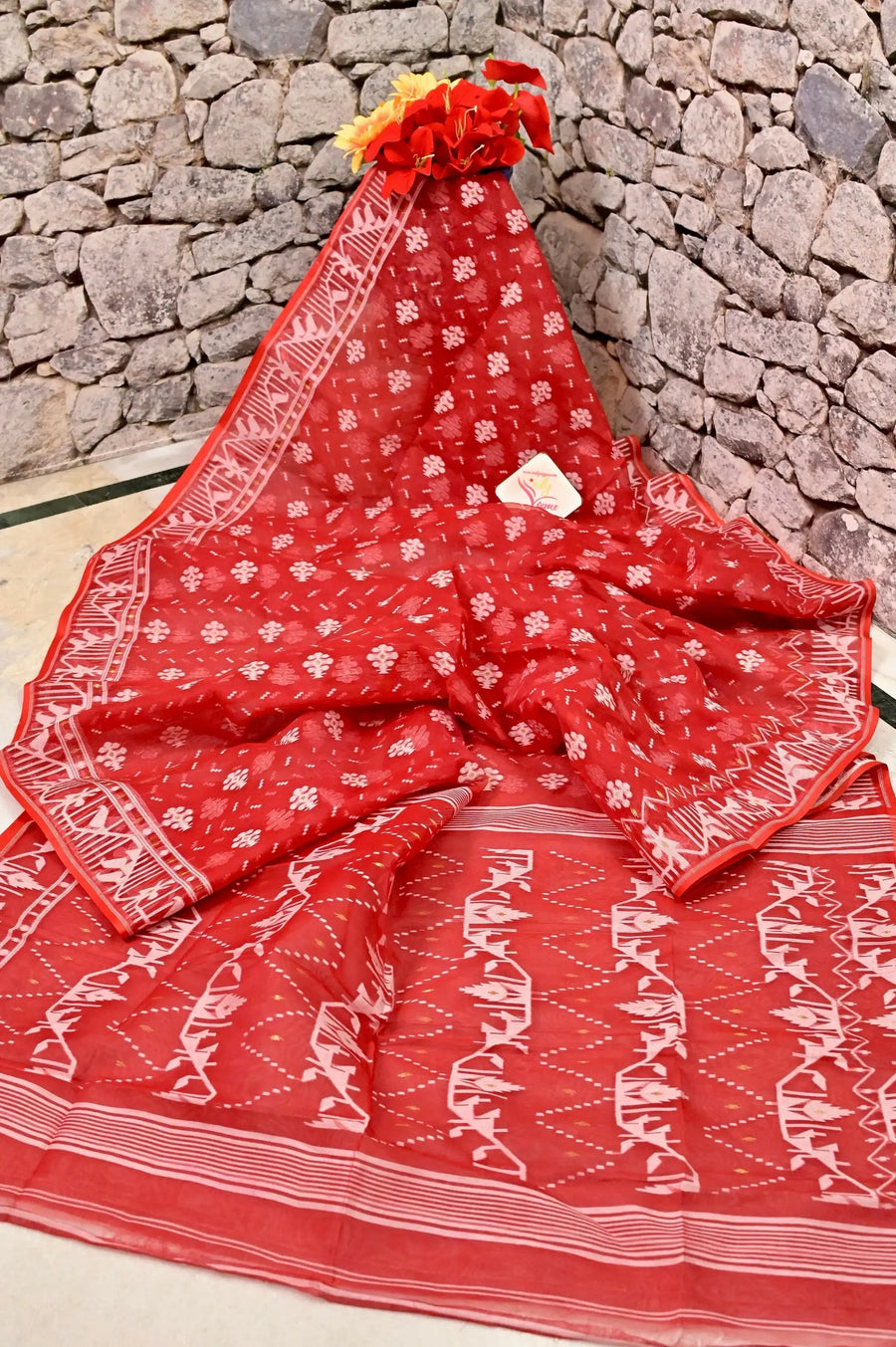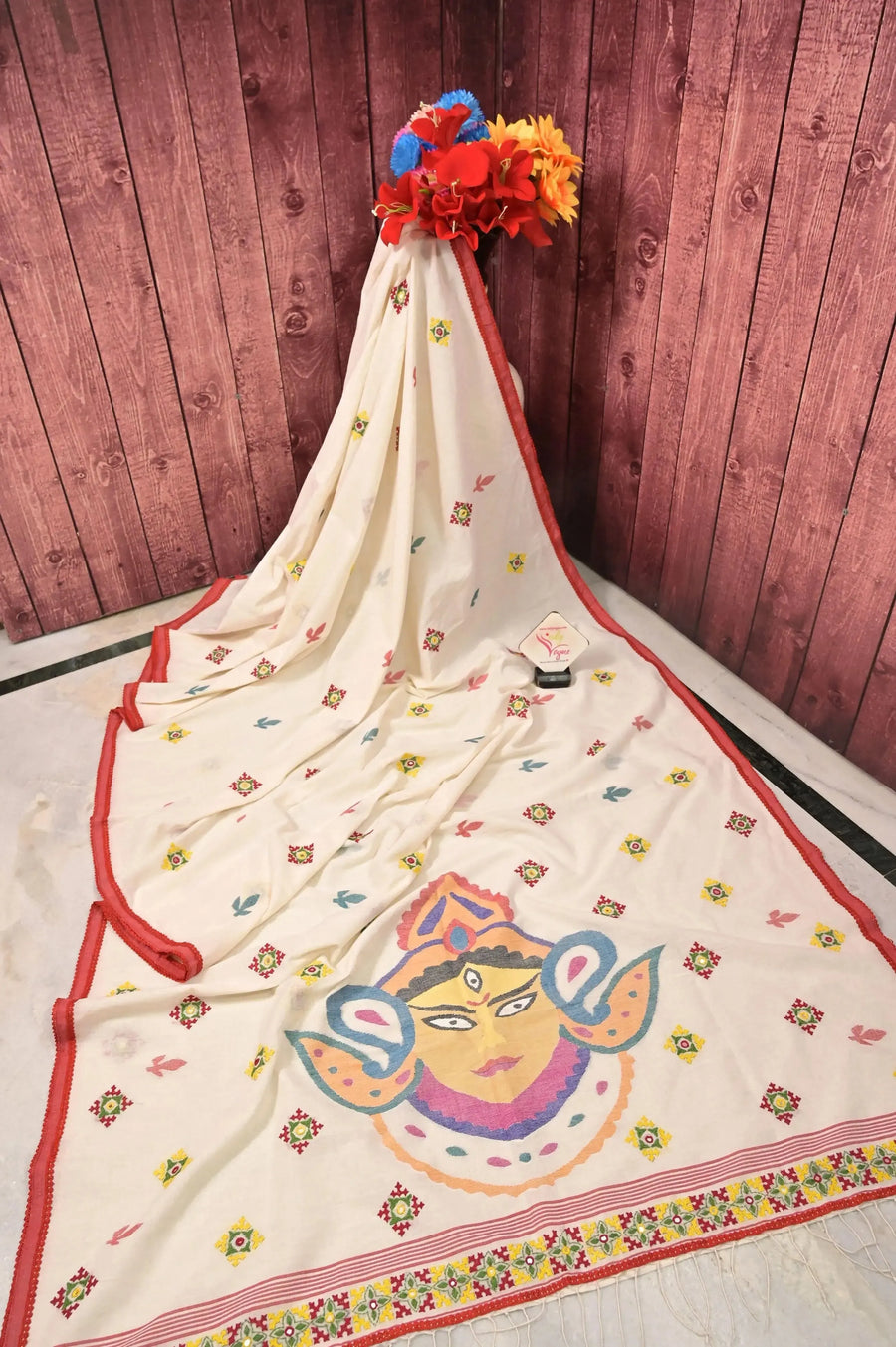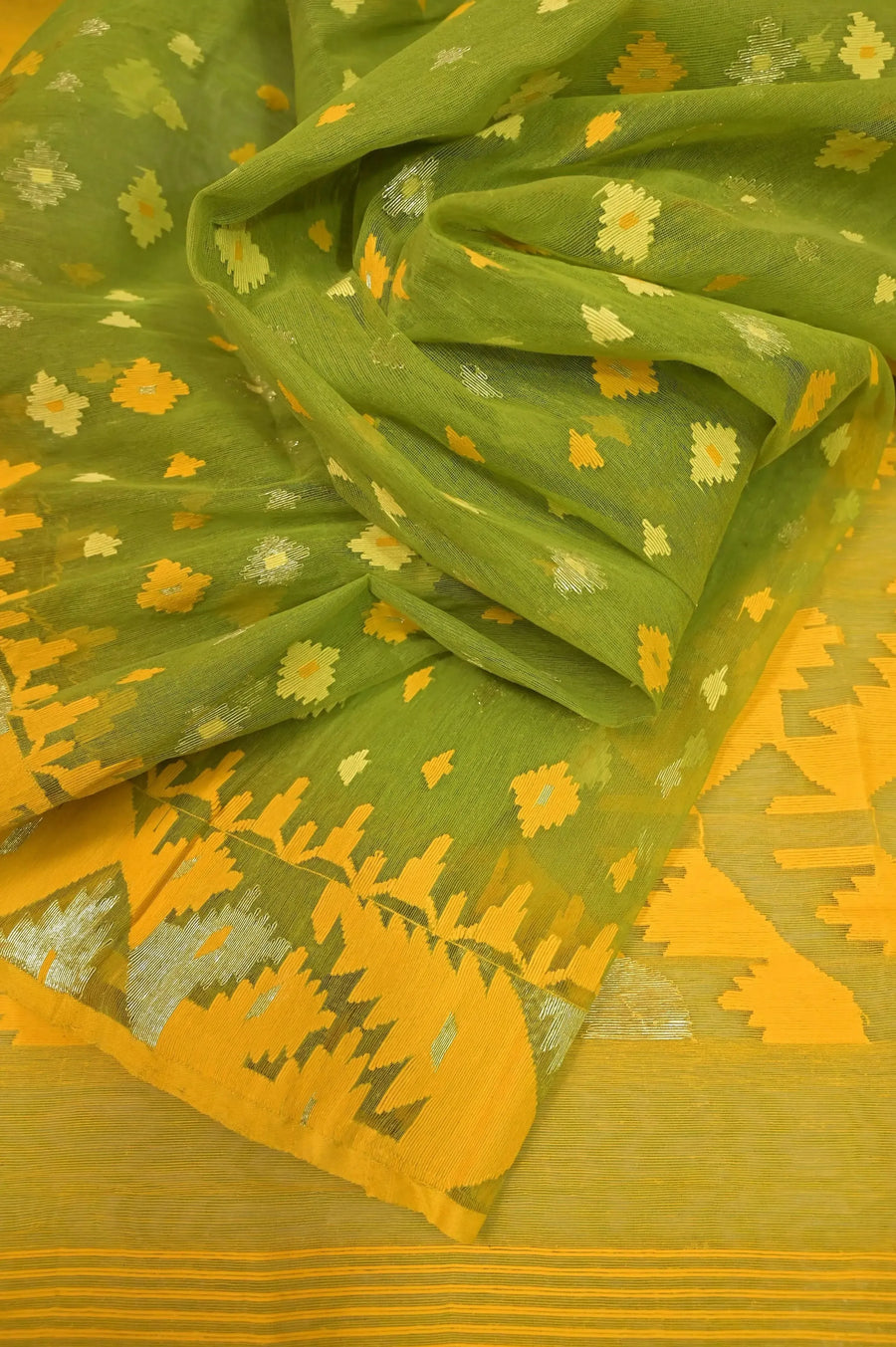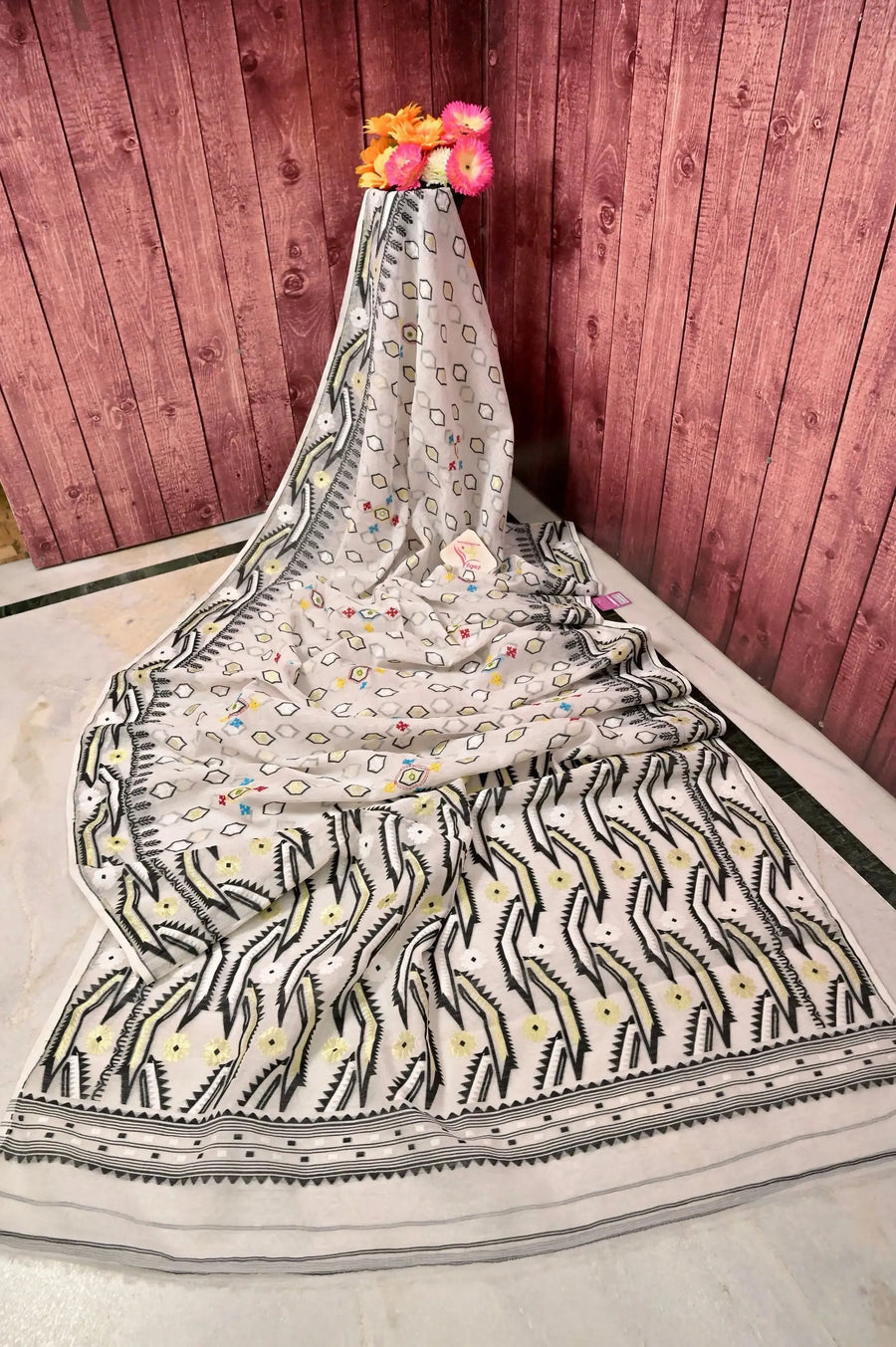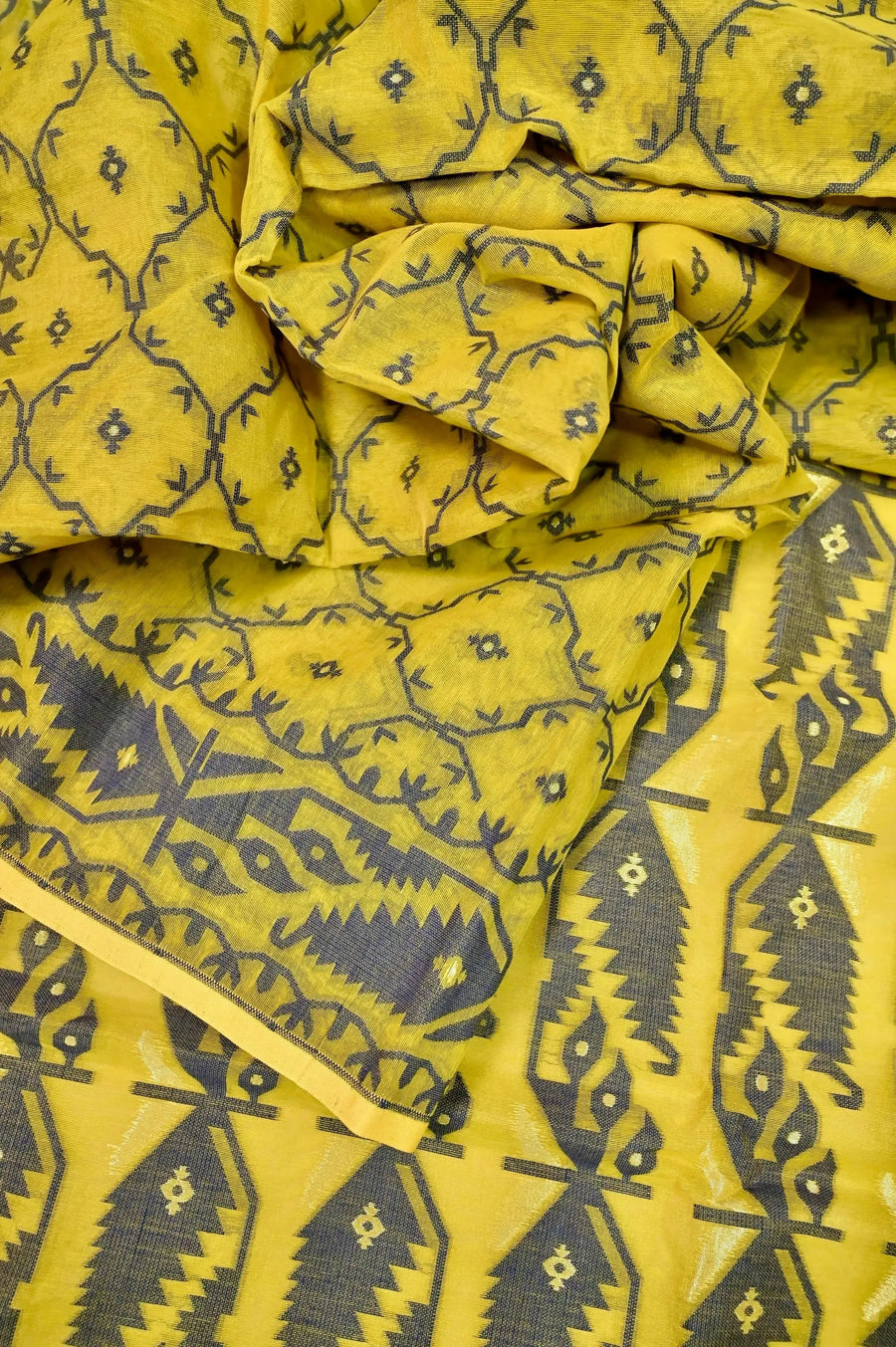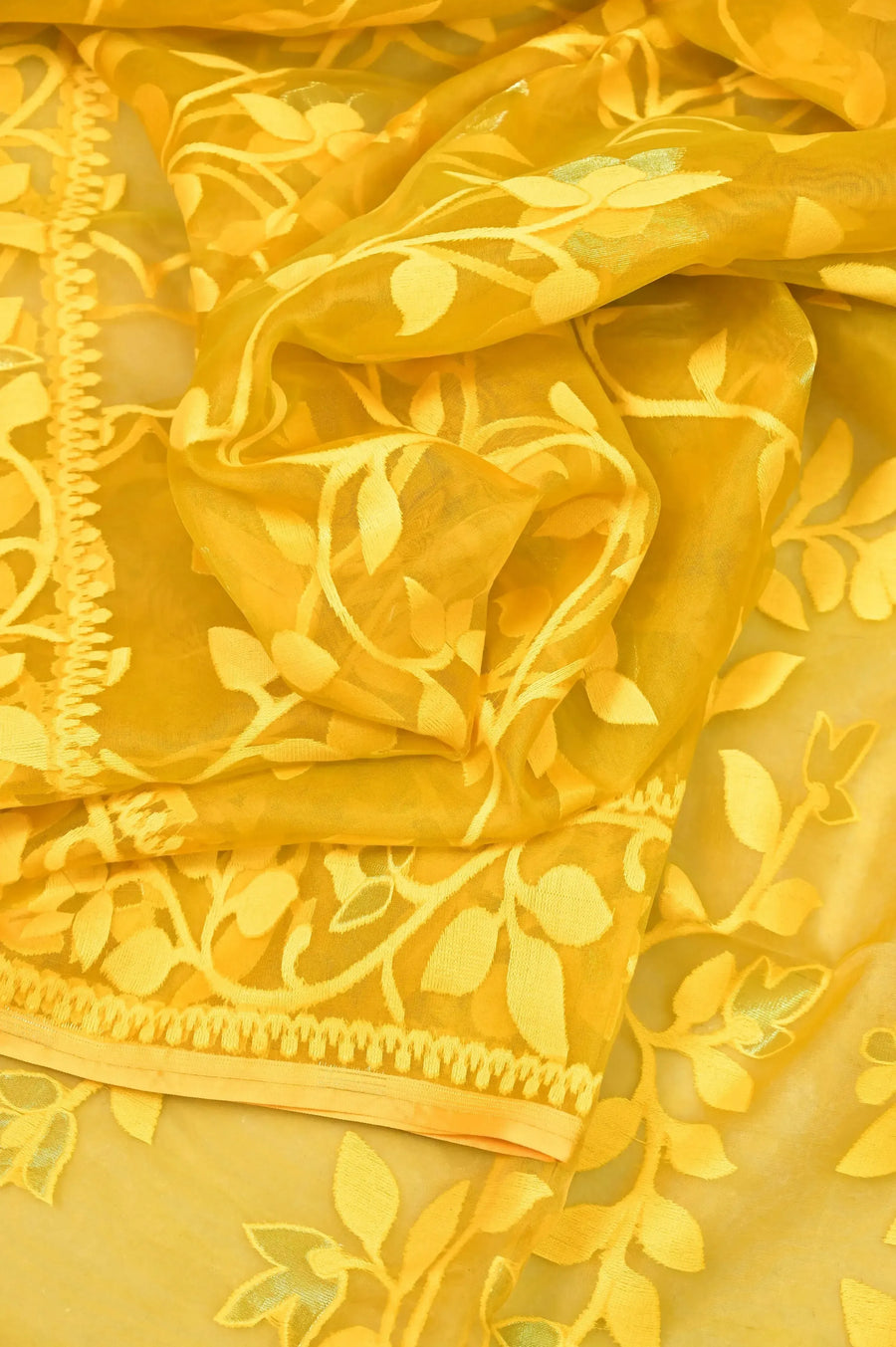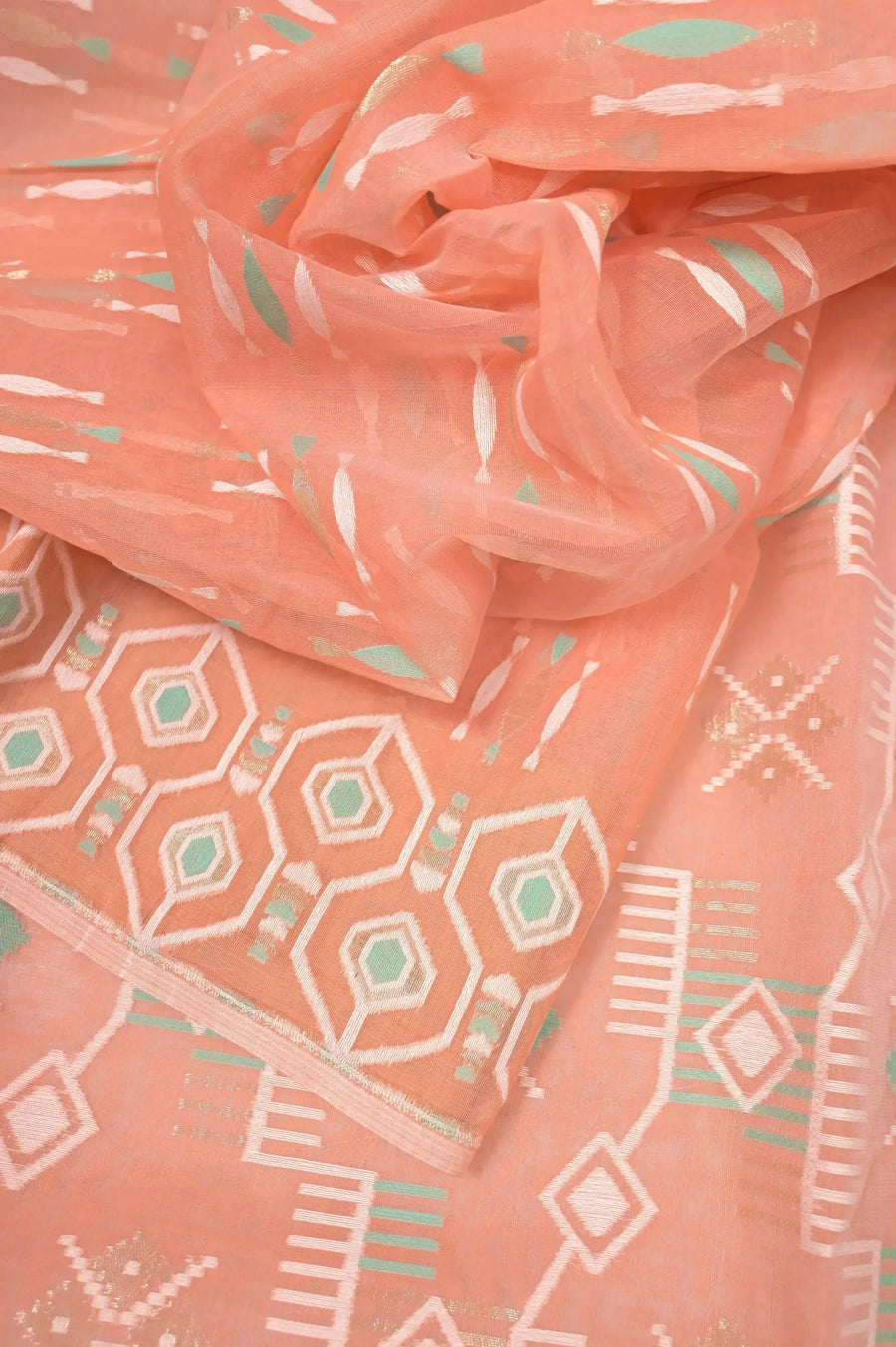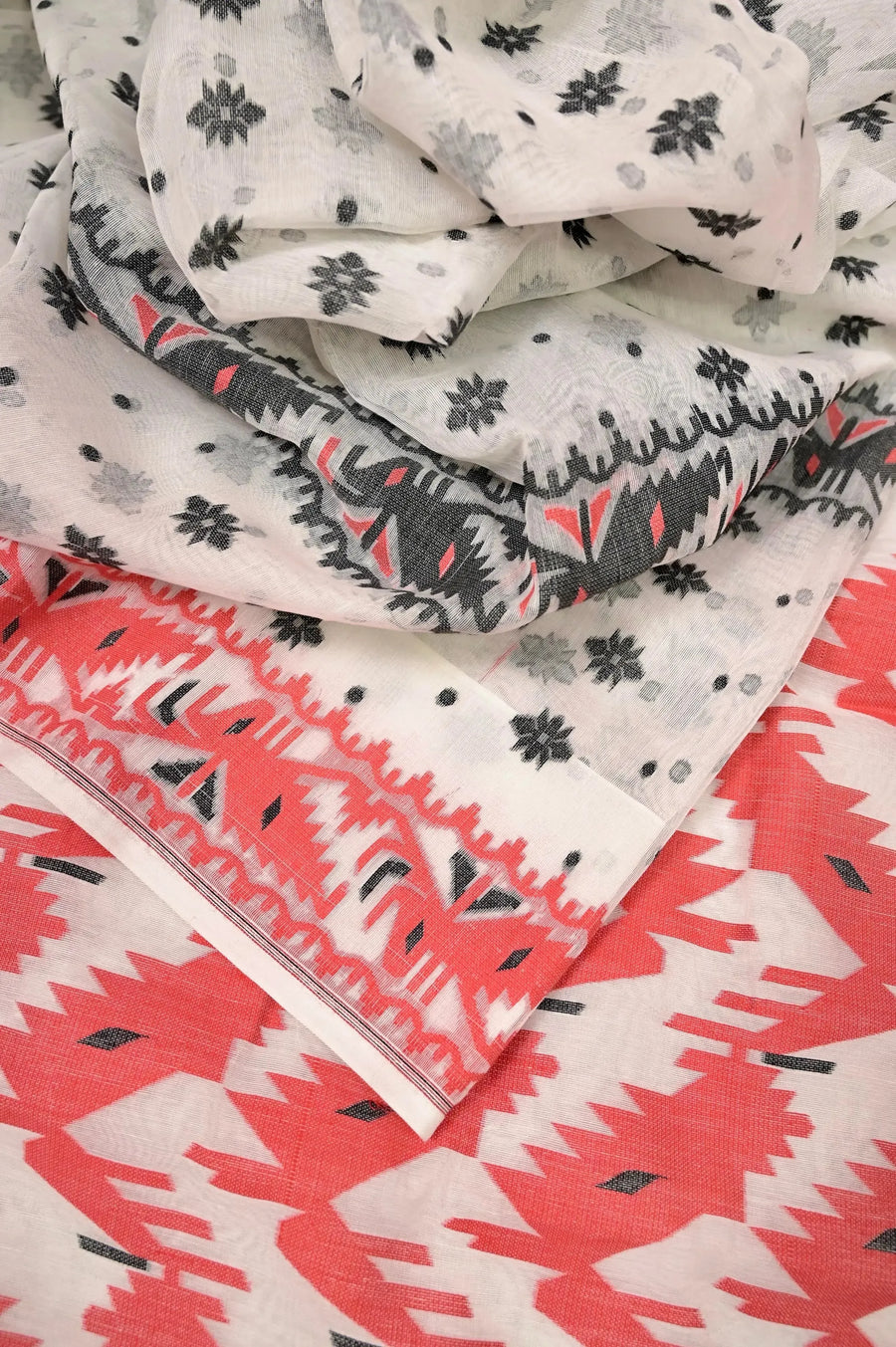Offwhite and Midnight Blue Color Durga Jamdani Saree...
Jamdani Saree in Crimson Red Color Self Jamdani Weav...
Pure Bangladeshi Dhakai Jamdani Saree in Offwhite an...
Sap Green Color Dual Tone Jamdani Saree with Allover...
Bangladeshi Dhakai Cotton Jamdani Saree in Magenta a...
Peach Pink Color Jamdani Saree with Allover Jamdani ...
White and Black Color Jamdani Saree with Allover We...
Light Green Color Jamdani Saree with Allover Weaving...
Jamdani Saree in Peach Color with Allover Jamdani We...
Yellow Color Matka Jamdani Saree with Lace Border
Grey and Navy Blue Color with Allover Jamdani Weavin...
Bluish Grey Color Jamdani Saree with Allover Jamdani...
Laurel Color Jamdani Saree with Allover Jamdani Weaving
Paper White and Orange Color Soft Jamdani Saree with...
Green Color Jamdani Saree with Allover Jamdani Weavi...
Magenta Wine Color Jamdani Saree with Allover Weavin...
Jamdani Saree in Red Color with Allover Jamdani Weav...
Pure Cotton Jamdani in Offwhite Color with Durga Fac...
Bangladeshi Dhakai Cotton Jamdani Saree in Light Gre...
Jamdani Saree in White and Black Color with Gujarati...
Jamdani Saree in Old Yellow Color with Allover Weavi...
Semi Muslin Saree in Marigold Yellow Color with Allo...
Jamdani Saree in Peach Color with Allover Jamdani We...
Jamdani Saree in Offwhite Color with Gap Border in R...
Envelop Yourself with Royal Weaves: Buy Authentic Dhakai Jamdani Sarees Online
If you’re looking for something ageless, dhakai-jamdani-sarees occupy a league. These sarees transcend mere traditional wear. They are handloomed masterpieces handed down through the eras. Every one of them is imbued with the essence of Bengal's heritage and the loveliness of intricate artisan work. At IndyVogue, we offer genuine Jamdani sarees that bridge tradition to your contemporary lifestyle.
Soft, light, and elegantly simple, the sarees are ideal for weddings, festival wear, family functions, or just any day you wish to look special.
What is so special about Dhakai Jamdani?
The magic is in the weaving. Each dhakai-jamdani-saree is created through an age-old handloom process where the designs are manually created thread by thread. The end result? The designs appear to float across the cloth. Whether crafted from cotton or silk, the saree is airy, smooth, and elegant.
Styles For All Occasions
Our range features an assortment of gorgeous designs to suit your style and the moment:
-
Tangail jamdani with broad borders and bold designs
-
Neatly striped Shantipuri Jamdani with soft beauty
-
Traditional Dhakai with traditional floral patterns
-
Uppada Jamdani provides a silk-like drape and shine
From everyday chic to holiday glamour, there's something for everyone.
Why choose IndyVogue?
Here’s why saree lovers trust us:
-
Each item is Silk Mark Certified
-
Directly sourced from master weavers
-
Quick and safe delivery throughout the USA and internationally
-
600+ positive reviews from satisfied customers
Fun and Convenient Shopping
Browse our website, review the descriptions, and order it all with just a few clicks. If you have inquiries, our supportive team is there to assist you.
Let Your Saree Speak
Your saree must speak of class and culture. Make it a dhakai-jamdani-saree from IndyVogue. Experience the beauty of tradition. Buy now and take home a masterpiece.
FAQs
1. What is a Dhakai Jamdani saree?
A Dhakai Jamdani saree is a Bengal-origin cloth which is characterised by intricate motifs floating on the cloth. Every saree is designed with an ancient technique in which the pattern is inserted thread after thread into the loom.
2. Are all Jamdani Sarees at IndyVogue authentic?
Yes. Each Dhakai Jamdani saree in IndyVogue is Silk Mark Certified and sourced directly from the master weavers in Bengal to guarantee authentic quality.
3. Which fabrics are used to make such sarees?
IndyVogue provides Dhakai Jamdani sarees in pure cotton as well as blended silk. Cotton provides ventilative comfort, whereas silk imparts elegant sheen as well as folds.
4. Can one wear a Jamdani saree every day?
Absolutely. Although many styles suit weddings or festive events, we also have lightweight daily wear, such as Shantipuri and Tangail Jamdani, which suit everyday elegance.
5. How do the Tangail, Shantipuri, and Dhakai styles differ?
Bold motifs and borders characterise Tangail Jamdani sarees. Shantipuri boasts slender weaves with understated stripes. Classic florals with delicate details characterise conventional Dhakai designs.
6. Does InfyVogue provide international shipping?
Yes. IndyVogue ships internationally quickly and safely, including to the USA, UK, Canada, and Australia.
7. How should I look after my Jamdani saree?
It is advisable to dry-clean your Jamdani saree. For the cotton types, hand washing in cold water is permissible. Store always in muslin cloth.
8. Can I see reviews to look at prior to buying?
Yes. IndyVogue boasts over 600 glowing customer reviews, with many complimenting the quality as well as the beauty of the sarees.
9. Is it easy and safe to shop online?
Yes, it is safe and easy to use. Browse the collections, read full product descriptions, and order in minutes.
10. Why would you select IndyVogue over the rest?
Because we blend heritage, handwork, and confidence. Our sarees honour tradition, provide authentic assurance, and belong in contemporary wardrobes.
JAMDANI SAREE
The Jamdani saree is the only surviving variety of authentic traditional muslin cloth. In the 9th century, a traveller called Sulaiman mentioned a sheer cloth belonging to Bangladesh. The base of this cloth was made of muslin, and it was so delicate and its quality was so fine that it could pass through a single ring. This fabric, or the saree made from this fabric was called the ‘Dhakai’, with respect to the place of its origin - Dhaka (Decca), a prominent textile weaving centre in Bangladesh.
HISTORY OF THE JAMDANI SAREE
In the 12th century, Islamic influences started to have their impact on the designs of the Dhakai saree, and the trend of infusing it with countless colours and motifs started. Around this time, the Dhakai also gained its new name - the ‘Jamdani’ saree, consisting of the two Persian words - ‘jam’, meaning floral, and ‘dani’, meaning ‘vase’’. The Jamdani saree came to be heavily patronised by the Mughal emperors, and its quality became renowned. At some point, the Greeks even considered it to be silk of the finest quality in the whole world.
In the 20th century, the base of the craft began to shift from Sonargaon to Rupganj. During the colonial era, the Jamdani saree faced a serious decline due to increased competition from British textiles. In recent years, the Jamdani saree has been revived considerably in Bangladesh. In 2013, UNESCO declared the craft of weaving Jamdani sarees an Intangible Cultural Heritage of Humanity.
LESSER KNOWN FACTS ABOUT THE JAMDANI SAREE
Time taken - The weaving of Jamdani sarees is one of the most labour-intensive crafts of handloom-weaving, because the motifs are produced with the help of discontinuous weft technique. The process requires skill and precision, like any form of serious art does. The motifs are all handmade, and the whole process is so time-consuming that a proper Jamdani saree can take even as much as a year to be completed.
Types of Jamdani sarees - Different regions produce different types of Jamdani sarees. For example, the Tangail Jamdani’s specialty lies in its broad borders, which are embellished with flower, leaf and sometimes, even animal motifs. The Shantipuri Jamdani, which has its home in India, contains polished, striped motifs, and the Dhaniakhali Jamdani has its borders in direct contrast to its bold hues.
The weaving process - A traditional Jamdani saree is fully handwoven. Coloured threads (usually gold or silver) are passed through the weft, and each weft has to be made thicker by the addition of heavier threads. The designs consist of denser, non-structural wefts, while the base is made of fine, sheer muslin. These designs are then attached to the base by hand, with the help of bamboo sticks. The end result is that the intricate design appears to be floating above the glittery surface. The patterns are not made directly onto the saree - rather, a graph paper containing them is placed below the weft.
The weavers - The Jamdani weavers are mostly men, and have communities located in Bangladesh as well as West Bengal. They use their hands and feet to operate the fabric.
The motifs - A Jamdani saree’s specialty and appeal lie in its unique designs. This is the very characteristic of the cloth that sets it apart from any ordinary muslin cloth. The motifs usually consist of geometric shapes or floral patterns. According to many scholars, these designs are of Persian origin. Popular patterns include the butidar, kalka, fulwar and panna hajar. The ‘anchal’, or the part that goes over the shoulder is often decorated with jhalar (floral motifs).
UNESCO recognition - In 2013, the art of weaving Jamdani sarees was declared to be a UNESCO Intangible Cultural Heritage of Humanity.
WHEN YOU SHOULD TRY THE JAMDANI SAREE
- Jamdani sarees are suitable for any occasion including weddings, family gatherings as well as casual outings. It is especially suited to India’s weather, for the transparent fabric makes it a comfortable wear for the humidity and warmth.
- For weddings, the traditional Dhakai Jamdani is definitely the most suitable, both for brides as well as guests. The Dhakai Jamdani will be a fabulous wear for any other traditional occasion as well, such as religious festivals (for example, during Durga Puja).
- The Uppada Jamdani is a fantastic choice for formal events, such as engagement parties or even house gatherings.
- For a cultural event, the Tangail Jamdani is the way to go. The brightness of these sarees is a testament to the colourful culture of India.
- The Shantipur Jamdani will be a great pick for a casual outing, or a day out. The light and airy fabric will give you the style, as well as comfort.
- You should also consider the season, as well as the weather. Summertime entails pastel or lighter shades, while winter prompts you to bring out the warmer fabrics. Jamdani sarees with relatively brighter colours or richer details should be reserved for evenings, and they are perfect for fairs or concerts.
HOW TO TAKE CARE OF YOUR JAMDANI SAREE
- Storage - Keep your jamdani saree away from places that are too moist or humid. Try to keep it in dry areas, and don’t keep it under the sun for long intervals. Fold it carefully within a cotton cloth and keep it away from other clothes.
- Folding and refolding - To avoid wrinkles and creases, do remember to unfold and then refold your Jamdani saree at regular intervals, even if you’re not wearing it anywhere. Just remember to take it out of your closet once in a while to preserve its crispy freshness.
- Dry cleaning - Your Jamdani saree should always be dry cleaned. You may wash it with your hands if you cannot help it, but be gentle and use mild detergents.
- Ironing - Your Jamdani saree should be ironed at a low heat all times. Do NOT use high temperatures as it can ruin the delicate threads and cause the colours to bleed and overlap. Place a cloth over the motifs before ironing them.
- Washing - Do not wash your Jamdani saree very frequently, as it might cause the fabrics to fade. Air out stains.
Caution - Make sure to not expose your Jamdani saree to particularly rough surfaces, as it might rip out the threads.
HOW TO SHOP AUTHENTIC JAMDANI SAREES ONLINE
- Certification tags - Always look out for certifications like the Silk Mark or Handloom Mark to ensure that the Jamdani saree you’re purchasing is made of authentic material.
- Designs and colors - Watch out for the designs on the borders of the Jamdani saree. Make sure they’re intricate and detailed, and fall in place with the rest of the saree.
- Product details - Pay attention to the dimensions and the weight of the saree, which are usually provided at the website you’re buying from. An authentic Jamdani saree will not be too heavy, as it is made of cotton.
- Customer reviews - Be sure to give the customer reviews a good read, because it is one of the most effective ways of verifying the quality of the product you’re interested in. IndyVogue has over 680+ reviews on Google and Facebook. We are the only Indian boutique which is rated as a "Top Quality Store" by google.
- Quality and designs - The appeal of the Jamdani saree lies in its majestic details, so make sure the saree you’re going for is intricately designed.
JAMDANI SAREES IN MOVIES AND POPULAR CULTURE
The Jamdani saree is an iconic and timeless piece, and there can be zero doubt about it. It is a testament of Bengal’s rich culture, and what it entails. It is a representation of India’s heritage, and has been portrayed in various films and books throughout the ages. This is, of course, true for any saree. Whether it be Aishwarya Rai’s iconic sarees in ‘Devdas’, or the sarees donned by female protagonists in Ray’s films, the saree continues to be a costume that evokes Indian sentiments and tradition. Let us take a look at some of those iconic moments:
Rani Mukherjee’s looks in ‘Mrs. Chatterjee vs. Norway’
‘Mrs. Chatterjee vs. Norway’ is a movie that portrays the values of motherhood as well as those of female empowerment, among many other themes. In the movie, Rani Mukherjee plays the role of a simple Bengali woman residing alongside her husband and two children in Norway. Throughout the movie, Rani Mukherjee accurately upholds the character of the typical ‘Bangali’ woman, who does her best to stay close to her roots and culture. She dons a series of gorgeous Dhakai Jamdani sarees over the course of the movie. Of these, those worth mentioning include the the white Jamdani she wore at the trial scene, as well as the iconic yellow Jamdani, which she wore at the scene where her children were taken away from her. These looks truly provide a window into Bengali values and culture, and only add to the femininity of Rani Mukherjee’s character. It is, after all, this very femininity that sparks the fierce motherly instincts within her. She refuses to bow down in the face of adversity, even when the world is against her. Mrs. Chatterjee is truly the embodiment of how a simple Bengali woman can take on the world wearing a saree and without yielding to the foreign culture imposed on her, just with the help of sheer courage, dedication, loyalty to her roots, and love for her children.
Sonakshi Sinha’s saree choices in ‘Lootera’
In the Bollywood movie ‘Lootera’, Sonakshi Sinha wears simple yet gorgeous Dhakai Jamdani sarees that she pairs with simple gold jewellery and basic makeup looks. In the song ‘Monta Re’, for example, she can be seen wearing a green Dhakai Jamdani, which she matches with a green half-sleeved blouse, as is often worn by most Bengali women. The saree might look basic at a superficial glance, but its beauty lies in its intricately designed pallu consisting of rich silver designs. In ‘Sawaar Loon’, she wars 9 different sarees, and each one is more iconic than the other. She sports a plethora of different colours including blue, yellow and orange. The scene where she is looking down from her balcony wearing an orange saree or the one where she is combing her hair in front of her dressing table in the green Jamdani - Sonakshi Sinha carries them all out with the utmost elegance.
Alia Bhatt's look in ‘Gangubai Kathiawadi’
In the movie ‘Gangubai Kathiawadi’, Alia Bhatt was seen wearing multiple white sarees. The actress dressed similarly during her promotional activities as well, looking like classy elegance personified in a gorgeous Dhakai Jamdani, and staying true to her iconic dialouge in the movie - “Gangu wala safed”. She added a pair of golden jhumkas to the look, and wore her hair up in a bun. The simple yet gorgeous look, paired with the pristine white of the saree, only added to the colour of her character.
Priyanka Chopra's orange Jamdani in ‘Gunday’
In the memorable song ‘Tune mari entriyaan’ from the film ‘Gunday’, Priyanka Chopra wears an orange Jamdani saree. The rest of her look included a green blouse, and flowers in her hair, which was let loose.
BIBI RUSSELL'S JAMDANI CREATION AT THE THE COMMONWEALTH FASHION EXCHANGE
In 2018, Bibi Russell graced the Commonwealth Fashion Exchange Programme with her innovation. Representing Bangladesh, her contribution to the event was a simple red outfit complete with a jacket, a scarf and a drape. The masterstroke was that the outfit was made out of Jamdani cloth. Through this project, Russell paid tribute to the hard work of the Jamdani weavers of Bangladesh, as well as to the culture of Bangladesh. The look was unveiled at Buckingham Palace in England.
Explore Our Collection
Suits & Dresses
Festive Wear Salwar Suits USA |
Collections By Type
Art Silk Sarees | Baluchari Silk Sarees | Banarasi Silk Saree | Bengal Cotton | Bishnupuri Silk Sarees | Chanderi Silk Sarees | Crepe Silk Sarees | Dupion Silk Sarees | Embroidery Sarees | Gadwal Silk Sarees | Georgette Silk Sarees | Ikat Silk Saree | Jamdani Saree | Kanchipuram / Kanjeevaram Silk Saree | Kani Silk Saree | Latest Saree Collection | Linen | Matka Silk Sarees | Paithani Saree in USA | Pure Organza Silk Sarees | Pure Silk Sarees | Raw Silk Sarees | Sale | Sambalpuri Silk Sarees | Tissue Sarees | Tussar Silk Saree |
Collections By Work
Bandhani Sarees | Hand Embroidery Sarees USA - Kantha Stitch Saree | Hand Painted Sarees | Kalamkari Sarees | Machine Embroidery Sarees | Printed Sarees | Sequin Sarees Collection |
Collections By Region
From the East | North Indian Sarees | Sarees of Central India | South Indian Silk Sarees | West Indian Saree |Collections By Occasion
Baisakhi Collection | Bollywood Sarees | Casual Wear Sarees | Cocktail Sarees | Festival Collection Saree | Party Wear Sarees | Saraswati Puja Collection | Valentine's Day Collection | Wedding Collection Saree |
Collections By Color
Black Saree Collection | Blue Sarees Collection | Golden Sarees Collection | Green Sarees Collection | Maroon Sarees Collection | Orange Sarees Collection | Pink Sarees Collection | Purple Sarees Collection | Red and White Saree Collection | Red Sarees Collection | White Sarees Collection | Yellow Sarees |
Collections By Price
Under $100 USD | Under $150 USD | Under $200 USD | Under $300 USD | Under $400 USD | Under $500 USD |
Special Collections
Double Savings Collection | Silk Mark Certified Saree | The Kolkata Collection |
Accessory Collections
Designer Blouse Online | Indian Fashion Jewellery | Trendy Designer Bags |


